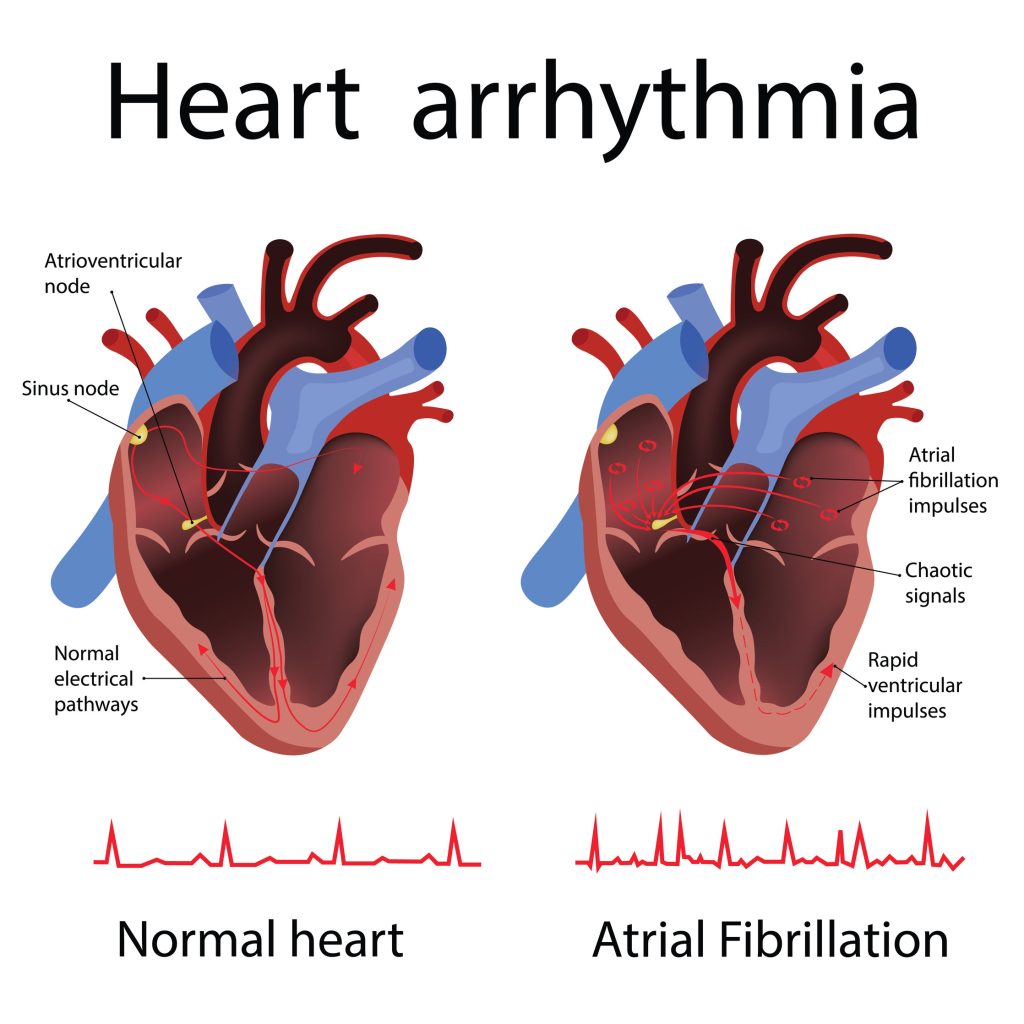How Does Our Arrhythmia Treatment Benefit You?
Arrhythmia is a heart condition in which a person experiences irregular heartbeat. These heart rhythm problems occur when the electric signals that co-ordinate with the heart beats do not work properly. The faulty signals either cause the heart to beat too fast (tachycardia) or to beat too slow (bradycardia) or completely irregular. Symptoms of this condition include: chest pain, shortness of breath, fluttering in chest, sweating, anxiety, fatigue, etc. The causes of arrhythmia are- heart attack, blocked arteries, diabetes, high blood pressure, hyperthyroidism, hypothyroidism, sleep apnea, drug abuse, etc.

Arrhythmia is a condition that is categorized under hridroga of ayurvedic literature. It causes due to vitiation of doshas:
- When Vata dosha is imbalanced, it causes irregular heart beats
- When Pitta dosha is aggravated, it causes increased heartbeat.
- When Kapha dosha is aggravated, it causes slowing down of heart beats.
Thus, imbalance in every dosha causes different pulses. Further, when there is vitiation of doshas, the ama is accumulated in the body leading to further complications.
Thus, while treating arrhythmia in ayurveda, it is important to pacify the effects of doshas, balance them and eliminate the accumulated toxins in the body. This is done by panchakarma procedures that help in detoxifying the body. It is also accompanied by Shirodhara that helps in restoring the normal pulses and electric signals that co-ordinate with heart beats. The entire procedure has some association with herbs like Arjuna, shankhapushpi, brahmi, Choti elaichi, pipal pvak, dalchini, etc. that have Cardiology-protective properties and help strengthen the heart muscles. This line of treatment helps in reversal of the condition in a natural and holistic way.
Understand how we can help you with Arrhythmia
Types of Arrhythmia
1. Tachycardia: It is a condition in which the heart rate is fast i.e. more than 100 beats per minute.
2. Bradycardia: It is a condition in which the heart rate is slow i.e. less than 60 beats per minute.
Causes
- Current heart attack or scarring from a previous heart attack
- Blocked arteries in the heart (coronary artery disease)
- Changes to the heart’s structure, such as from cardiomyopathy
- Diabetes
- High blood pressure
- Infection with COVID-19
- Overactive thyroid gland (hyperthyroidism)
- Sleep apnoea
- Underactive thyroid gland (hypothyroidism)
- Certain medications, including cold and allergy drugs bought without a prescription
- Drinking too much alcohol or caffeine
- Drug abuse
- Genetics
- Smoking
- Stress or anxiety
Risk factors for arrhythmia
- Coronary artery disease: Almost any type of arrhythmia can be caused by narrowed heart arteries, a heart attack, faulty heart valves, previous heart surgery, heart failure, cardiomyopathy, and other heart problems.
- Blood pressure is high: This condition raises your chances of getting coronary artery disease. It may also stiffen and thicken the walls of the left lower heart chamber (left ventricle), altering how electrical signals pass through the heart.
- Heart defect from birth: A cardiac issue that is present at birth might impair the heart’s rhythm.
- Thyroid problems: Irregular heartbeats can be caused by an overactive or underactive thyroid gland.
- Obstructive sleep apnea: During sleep, this syndrome produces breathing pauses. It can cause bradycardia (slow heartbeat) and irregular heartbeats, such as atrial fibrillation.
- Deficiency in electrolytes: Electrolytes in the blood, such as potassium, sodium, calcium, and magnesium, enable the heart to initiate and deliver electrical impulses. Electrolyte imbalances, such as when they are too low or too high, can disrupt cardiac signals and cause irregular heartbeats.
- Intake of some medications and supplements: Arrhythmias can be caused by several prescription pharmaceuticals and non-prescription cough and cold remedies.
- Excessive alcohol consumption: Drinking too much alcohol might disrupt your heart’s electrical impulses, increasing your risk of developing atrial fibrillation.
Ayurveda for arrhythmia
Arrhythmia is a condition that is categorized under hridroga of ayurvedic literature. It causes due to vitiation of doshas:
- When Vata dosha is imbalanced, it causes irregular heart beats
- When Pitta dosha is aggravated, it causes increased heartbeat.
- When Kapha dosha is aggravated, it causes slowing down of heart beats.
Thus, imbalance in every dosha causes different pulses. Further, when there is vitiation of doshas, the ama is accumulated in the body leading to further complications.
Thus, while treating arrhythmia in ayurveda, it is important to pacify the effects of doshas, balance them and eliminate the accumulated toxins in the body. This is done by panchakarma procedures that help in detoxifying the body. It is also accompanied by Shirodhara that helps in restoring the normal pulses and electric signals that co-ordinate with heart beats. The entire procedure has some association with herbs like Arjuna, shankhapushpi, brahmi, Choti elaichi, pipal pvak, dalchini, etc. that have Cardiology-protective properties and help strengthen the heart muscles. This line of treatment helps in reversal of the condition in a natural and holistic way.





